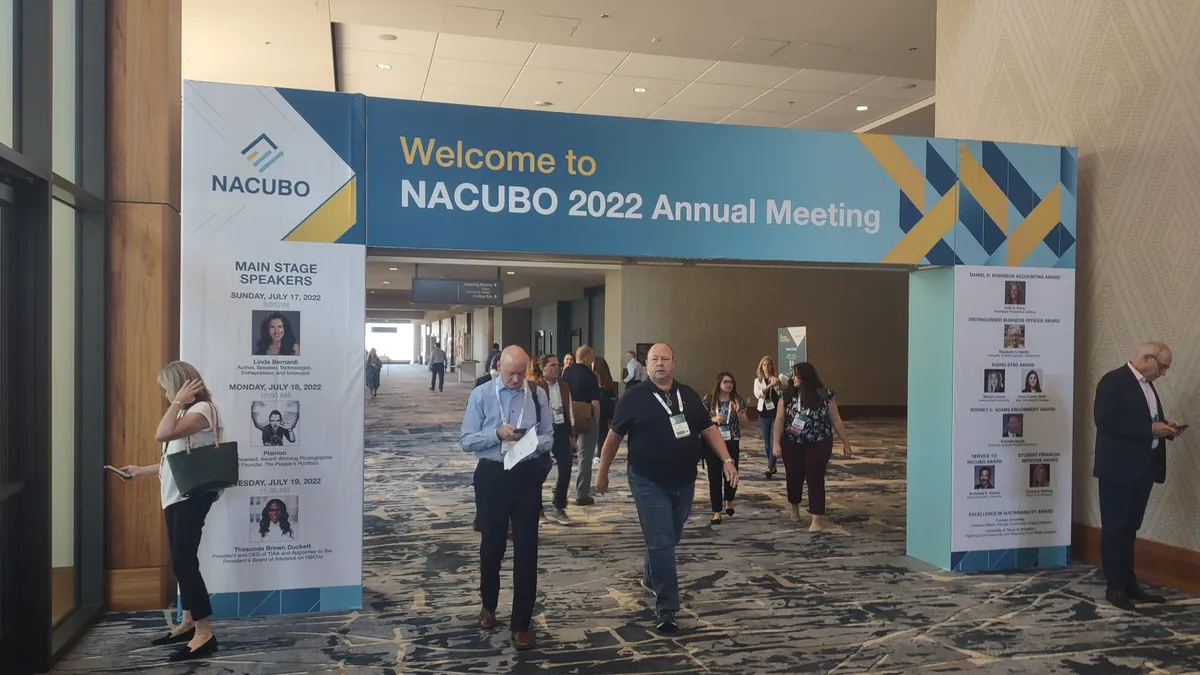AURORA, Colorado — With the midterm elections fast approaching, Congress is unlikely to pass much in the next few months that will substantially change conditions for higher education, according to a session at the National Association of College and University Business Officers’ annual meeting.
Democrats are working on spending legislation that would increase the maximum size of the Pell Grant by $500, to $7,395. It would also expand federal financial aid to immigrants who are protected from deportation under the Deferred Action for Childhood Arrivals program and provide some extra money for areas like community colleges, federal work-study and workforce training.
And lawmakers may be moving toward a legislative fix for what’s known as the 85-15 rule, which doesn’t allow Veterans Affairs benefits to go to students if they enroll in a college program where more than 85% of students receive VA funding to pay for college. Recent guidance has caused confusion in the sector and prompted some colleges to indicate the rule could hurt their ability to accept veterans.
Prospects for passing any legislation, however, are uncertain in today’s gridlocked Congress. Still, business officers have plenty to pay attention to at the federal level, said Liz Clark, vice president for policy and research at NACUBO. That includes the following, she said in a session Sunday:
- In the U.S. Supreme Court’s next term, which starts in October, the justices will hear arguments in a consolidated case brought by an anti-affirmative action group. Their decision covering Students for Fair Admissions v. President and Fellows of Harvard and Students for Fair Admissions v. University of North Carolina will determine whether colleges can use race-conscious admissions practices.
- The 3rd U.S. Circuit Court of Appeals is expected to rule on whether Division I student-athletes qualify as employees under the Fair Labor Standards Act in Johnson v. NCAA.
- The Biden administration is moving to put new regulations into place that will affect higher ed. In many cases, they could end up in court, such as new Title IX rules the administration released last month. Even before a draft Title IX regulation was published, a group of conservative attorneys general threatened to sue over them.
Those situations will lead to uncertainty as business officers try to prepare their institutions to comply with different legal outcomes.
“You are going to be doing a delicate dance between trying to comply with what the administration is proposing and then what justices are acting on as they take up cases,” Clark said. “Buckle up. There is going to be a lot of regulatory dancing in your future.”
Clark highlighted several such regulatory changes of interest to business offices:
- The Municipal Securities Rulemaking Board has asked about whether it should collect more information about environmental, social and governance factors in tax-exempt securities. This is essentially an attempt to determine if debt is being rated properly, Clark said.
- The U.S. Securities and Exchange Commission has proposed new audit, record and compliance rules for the private investment funds industry.
- NACUBO expects the Department of Labor to reevaluate the federal salary threshold for overtime, with a new cutoff to be proposed in October. Currently, certain employees earning more than $35,568 per year aren't eligible for overtime work. An increased threshold would push institutions to decide whether to raise salaries or classify employees as hourly workers subject to overtime.
- The Department of Education is working on new financial responsibility rules for colleges. As part of the financial responsibility rulemaking process, consumer groups raised the issue of institutions withholding transcripts or blocking registration for students who owe them money. Critics say this practice harms students and can hurt institutions if it prevents students from continuing their education. It’s an issue that’s gained traction in states, with some banning transcript withholding. But it’s contentious in the business officer world, which wants tools to collect revenue to pay institutions’ bills — and some states require public institutions to try to collect on debts.














